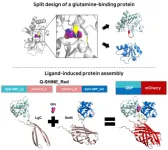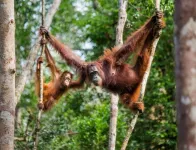(Press-News.org) Predators must eat to survive — and to survive, prey must avoid being eaten. One theory, the Wolf-Mangel model, suggests predators could use false attacks to tire prey out or force them to take bigger risks, but this has been hard to show in practice. Now, scientists observing peregrine falcons have found evidence that they deliberately exhaust their prey to improve later hunting success.
“Although predators are imagined as clever in novels and movies, like the velociraptors in Jurassic Park, empirical biologists are generally not inclined to give much credence to such ideas,” said Dr Ronald Ydenberg of Simon Fraser University, lead author of the study in Frontiers in Ethology. “I have often been puzzled when watching raptors by aspects of their behavior, such as prominent perching or otherwise making evident that they are present. The theoretical paper by Wolf and Mangel offered an explanation.”
On the wing
Pacific dunlins spend their winters in large flocks on temperate mudflats, like Boundary Bay in British Columbia, Canada. The peregrine falcons that hunt them find hunting easier when the tide drives the dunlins closer to land, because dunlins usually roost at high tide and the shore vegetation makes it easier to ambush them.
However, during the 1990s, the presence of peregrine falcons increased at Boundary Bay, and the dunlins began to replace roosting with over-ocean flocking — flying as a group over the waves. This stops the peregrines ambushing them but costs energy and foraging time.
The Wolf-Mangel model suggests that hungry prey will invest more effort in foraging than avoiding predators, and that predators can exploit this. Ydenberg and his colleagues sought to test this, using decades of data provided by Dr Dick Dekker, to whom the study is dedicated on his 90th birthday.
“I first worked with Dick in 2003,” said Ydenberg. “He was an independent, self-financed scientist with an obsessive interest in watching peregrines that started as a teenager. There was just no other source in the world for the sort of information he collected.”
Flocking to safety
Peregrines could use false attacks to make dunlins flock, but even experienced observers cannot be sure which attacks are serious. So the researchers looked at the dunlins’ behavior instead.
The scientists watched them from dawn to dusk for 34 days and analyzed a six-hour period centering on high tide. They also drew on 151 days of data recording peregrine attacks, to estimate the risk of predation at different times of day.
If dunlins flocked over the ocean — which they did on 68% of observation days — they did so for about three hours a day. They did not flock when conditions made it energetically costlier or when there were other safe options. They also did not flock at night, when falcons don’t hunt.
Trying out tactics or trying their luck?
The hunting data showed that dunlins were at greatest risk of predation just before and just after high tide, and spent most of the riskiest period flocking. However, there was a sharp increase in kills two hours after high tide, because the dunlins were not flocking despite elevated risk.
Over-ocean flocking reduces the risk to the dunlins, whereas high tide improves the peregrines’ chances. Dunlins should wait to flock — optimizing their flocking could reduce mortality by up to 45% — but they don’t, because the peregrines are a threat. By provoking the dunlins into flocking early, the peregrines deprive them of opportunities to forage and the energy they need to continue flocking later in the day.
The scientists considered whether more skilled peregrines wait until the dunlins are tired to hunt, but could not test this. However, they did find that a different species of bird in a different bay also flocks when threatened by peregrines. The same pattern of early flocking and later kills appears, suggesting that this is down to a hunting strategy rather than variations in skill.
“There are other hypotheses that might explain these results. Testing those requires detailed tracking of individual peregrines,” cautioned Ydenberg. “That doesn't seem feasible in this system, but as the basic ideas should apply more widely testing could happen in other systems.”
END
Peregrine falcons set off false alarms to make prey easier to catch
Scientists find that peregrine falcons use feint attacks to force prey birds to take more risks
2023-10-11
ELSE PRESS RELEASES FROM THIS DATE:
Make diagnosing serious geriatric diseases as easy as measuring blood sugar
2023-10-11
In 2023, life expectancy in Korea will be 83.6 years, the third highest among OECD countries, and it is steadily increasing every year. As the proportion of the elderly population increases, the social cost of treating various geriatric diseases is also increasing rapidly, and there is a growing interest in early diagnosis of diseases. Among the various diagnostic methods, researchers are actively conducting research on measuring glutamine as an indicator of geriatric diseases by finding that the concentration of glutamine in the cells and blood of patients with serious diseases such as cancer, diabetes, and dementia is significantly changed compared to normal people.
Dr. Seo, Moon-Hyeong ...
Commonly used herbicide is harmful to adolescent brain function
2023-10-11
Herbicides are the most used class of pesticides worldwide, with uses in agriculture, homes and industry. Exposures to two of the most popular herbicides were associated with worse brain function among adolescents, according to a study led by researchers at the Herbert Wertheim School of Public Health and Human Longevity Science at University of California San Diego.
In the Oct. 11, 2023 online issue of Environmental Health Perspectives, the researchers reported measuring metabolite concentrations of two commonly used herbicides — glyphosate and 2,4-dichlorophenoxyacetic acid (2,4-D) — and the insect repellent DEET in urine samples ...
New antibiotic drug developed by HKU Chemistry research team approved for clinical trials in humans
2023-10-11
A new antibiotic drug developed by a research team led by Professor Li Xuechen from the Department of Chemistry at The University of Hong Kong (HKU) has recently gained approval from the authorities to undergo clinical trials in the Mainland.
The new drug, which has taken the research team ten years to develop and is named Kynomycin, received the "Notice of Approval for Drug Clinical Trials" from the National Medical Products Administration of China to be tested in human subjects.
The new antibiotic drug targets complex skin and soft tissue infections (cSSTI) caused by bacteria. It ...
Scientists discover ‘flipping’ layers in heterostructures to cause changes in their properties
2023-10-11
Transition metal dichalcogenide (TMD) semiconductors are special materials that have long fascinated researchers with their unique properties. For one, they are flat, one-atom-thick two-dimensional (2D) materials similar to that of graphene. They are compounds that contain different combinations of the transition metal group (e.g., molybdenum, tungsten) and chalcogen elements (e.g., sulfur, selenium, tellurium).
What's even more fascinating is that assembling different TMD layers into vertical stacks creates a new artificial material called a van der Waals (vdW) heterostructure. By incorporating different materials, it becomes possible to ...
USC researchers develop blood test for early-stage ovarian cancer
2023-10-11
High-grade serous ovarian carcinoma (HGSOC) is the most common type of ovarian cancer. It is also the most lethal form, in part because clinicians do not have effective ways to screen women for it during the cancer's early stages, when it's easiest to treat.
For patients with a pelvic mass (an abnormal lump or growth in the lower abdomen), it is difficult to detect whether the growth is benign or cancerous ahead of surgery. Unlike many other cancers, biopsies are typically not an option. That makes it hard for doctors to choose the best course of treatment.
Now, a new blood test ...
Killing remains a threat to Bornean orangutans
2023-10-11
University of Queensland research has found despite considerable conservation efforts, the illegal killing of critically endangered orangutans on Borneo may be an ongoing threat to the species.
PhD candidate Emily Massingham from UQ’s Faculty of Science managed a team of researchers which visited 79 villages across the Bornean orangutan range in Kalimantan, conducting face to face interviews with 431 people.
“Our study builds on previous research which indicated killing was one of the key reasons for orangutan population decline, alongside habitat loss,” Ms Massingham said.
“The ...
Lundquist Investigator Dr. Loren Miller is the lead author of the “universal decolonization” study published in the New English Journal of Medicine
2023-10-11
Nursing homes that use a chlorhexidine bathing routine to clean the skin, and an over-the-counter antiseptic to clean the nose, prevent serious infections and reduce the amount of antibiotic-resistant organisms in the nursing home setting, according to the findings of researchers at Harbor-UCLA Medical Center, the University of California, Irvine, and the Centers for Disease Control and Prevention (CDC). The findings were published today in the New England Journal of Medicine.
“The ...
Renting rather than owning a private sector home linked to faster ‘biological ageing’
2023-10-11
The biological impact of renting, as opposed to owner occupancy, is nearly double that of being out of work vs having paid employment, the findings suggest.
Fortunately, these effects are reversible, emphasising the importance of housing policy in health improvement, say the researchers.
Numerous aspects of housing are associated with physical and mental health, including cold, mould, crowding, injury hazards, stress, and stigma. But exactly how they might exert their effects isn’t entirely clear, say the researchers.
To explore this further, they drew on epigenetic ...
Genes may be responsible for third of complex regional pain syndrome cases
2023-10-11
But the condition is less common in men, even though they are more likely to have the 4 genetic variations implicated in heightened risk, suggesting that there may be sex specific causes, say the researchers.
Most cases of CRPS are usually triggered by an injury, with the skin of the affected body part hypersensitive to the slightest touch or temperature change. CRPS is difficult to treat, and while it often improves with time, some people experience intense pain for many years.
But why some people develop CRPS yet others don’t after the same injury, isn’t clear. ...
Singapore’s smoke-free law may have warded off 20,000 heart attacks in over 65s
2023-10-11
The extension was associated with a monthly fall in the rate of heart attacks, with older people and men benefitting the most from the move.
Second-hand smoke exposure is responsible for 1.3 million annual deaths around the globe, many of which are caused by heart attacks, note the researchers.
But the existing evidence on the health benefits of comprehensive smoke-free laws, which many countries (67 since 2003) have implemented, is largely confined to indoor smoking bans rather than those for housing estates and outdoor spaces, they say.
In 2013 Singapore extended smoke-free legislation ...
LAST 30 PRESS RELEASES:
Striking genomic architecture discovered in embryonic reproductive cells before they start developing into sperm and eggs
Screening improves early detection of colorectal cancer
New data on spontaneous coronary artery dissection (SCAD) – a common cause of heart attacks in younger women
How root growth is stimulated by nitrate: Researchers decipher signalling chain
Scientists reveal our best- and worst-case scenarios for a warming Antarctica
Cleaner fish show intelligence typical of mammals
AABNet and partners launch landmark guide on the conservation of African livestock genetic resources and sustainable breeding strategies
Produce hydrogen and oxygen simultaneously from a single atom! Achieve carbon neutrality with an 'All-in-one' single-atom water electrolysis catalyst
Sleep loss linked to higher atrial fibrillation risk in working-age adults
Visible light-driven deracemization of α-aryl ketones synergistically catalyzed by thiophenols and chiral phosphoric acid
Most AI bots lack basic safety disclosures, study finds
How competitive gaming on discord fosters social connections
CU Anschutz School of Medicine receives best ranking in NIH funding in 20 years
Mayo Clinic opens patient information office in Cayman Islands
Phonon lasers unlock ultrabroadband acoustic frequency combs
Babies with an increased likelihood of autism may struggle to settle into deep, restorative sleep, according to a new study from the University of East Anglia.
National Reactor Innovation Center opens Molten Salt Thermophysical Examination Capability at INL
International Progressive MS Alliance awards €6.9 million to three studies researching therapies to address common symptoms of progressive MS
Can your soil’s color predict its health?
Biochar nanomaterials could transform medicine, energy, and climate solutions
Turning waste into power: scientists convert discarded phone batteries and industrial lignin into high-performance sodium battery materials
PhD student maps mysterious upper atmosphere of Uranus for the first time
Idaho National Laboratory to accelerate nuclear energy deployment with NVIDIA AI through the Genesis Mission
Blood test could help guide treatment decisions in germ cell tumors
New ‘scimitar-crested’ Spinosaurus species discovered in the central Sahara
“Cyborg” pancreatic organoids can monitor the maturation of islet cells
Technique to extract concepts from AI models can help steer and monitor model outputs
Study clarifies the cancer genome in domestic cats
Crested Spinosaurus fossil was aquatic, but lived 1,000 kilometers from the Tethys Sea
MULTI-evolve: Rapid evolution of complex multi-mutant proteins
[Press-News.org] Peregrine falcons set off false alarms to make prey easier to catchScientists find that peregrine falcons use feint attacks to force prey birds to take more risks




